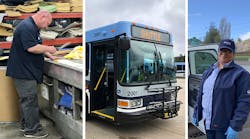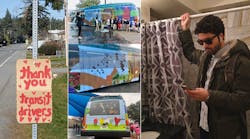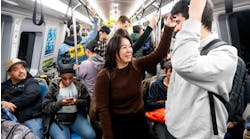Like many of you, CityLab’s recent article “In a Pandemic, We're All 'Transit Dependent,'” by Jarrett Walker, had us thinking this week. Per usual, Walker provides many insights to transit’s value within society, but none struck a chord like the following two sentences: The goal of transit, right now, is not competing for riders nor providing a social service. It is helping prevent the collapse of civilization.
That’s a gut-punch of a statement that produces equal parts pride and anxiety. The entire article is worth your time to read and this installment of “Five Good Things” shows all the ways transit systems are moving those who need it so the rest of us can stay home until this pandemic ceases.
1. The heart of the matter: Moving essential workers to their jobs across the spectrum of healthcare and first responder roles to positions supporting the greater supply chain that make modern life possible.
2. Even when there is a clog in the supply chain, agency representatives will find a way to get what is needed. Denver Regional Transportation District (RTD) Board Director Natalie Menten has launched a sewing crusade (involving fellow board directors and her parents) to supply RTD workers with face masks to supplement the N95 masks, which are in short supply. She has even put together a helpful how-to sheet.
3. Another commodity that’s been in short supply: Hand sanitizer. Distilleries across the U.S. have converted their facilities for hand sanitizer production that transit agencies have both benefited from and helped distribute to communities.
4. Food insecurity is an issue that has come to the forefront with the shuttering of schools and other support services to respect social distancing. However, agencies across North America have stepped in to transport groceries for elderly riders, deliver food to at-risk populations and ensure the meals students receive when they are at school continue even with schools closed in many areas.
5. Mass Transit previously reported on agency efforts to transport unsheltered populations to temporary housing and gave a brief nod to Edmonton Transit Service, but we are including the agency again because the main focus of the story published on the city of Edmonton’s website, Derek Bailey, humanized the issue so well, it deserves another look.
Bonus: Agencies are providing support in ancillary and, arguably, non-essential but still appreciated ways, such as through kid-friendly activity sheets (we have an entire list here) and interesting Zoom backgrounds.





